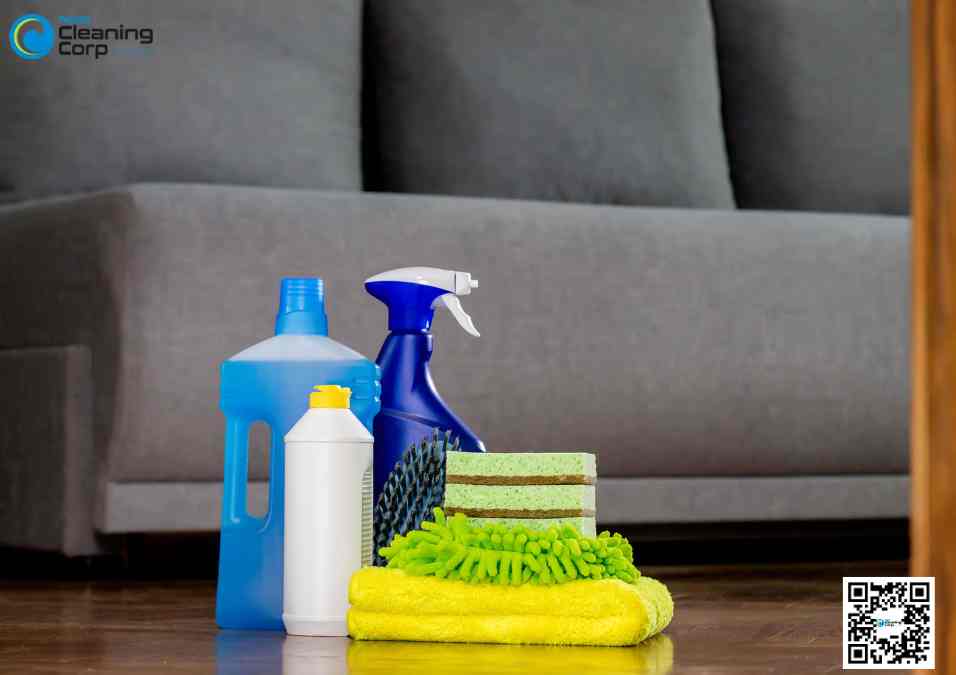Does the NDIS Fund Cleaning Services?
Yes. The NDIS does fund cleaning services — but it...
The importance of deep cleaning in NDIS support plans cannot be overstated.
As the owner of NDIS Cleaning Corp., I’ve seen firsthand how a clean environment can make a world of difference for individuals with disabilities. For those who may not be familiar, the National Disability Insurance Scheme (NDIS) is an initiative by the Australian government designed to provide support and services for people with disabilities. The goal is straightforward yet profound: to enhance the quality of life for individuals by providing them with the necessary resources to live independently and fully engage in their communities.
Now, let’s talk about something that might not immediately come to mind when discussing NDIS support: cleanliness. Maintaining a clean environment is not just about aesthetics; it plays a crucial role in health, safety, and overall well-being. For many individuals with disabilities, having a clean and organized space can significantly impact their daily lives. When we think of deep cleaning as part of NDIS support plans, we’re recognizing that a clean home is essential for fostering independence, dignity, and a sense of security.
Deep cleaning goes beyond what we typically think of as “clean.” It involves a thorough, meticulous approach to cleaning that targets every corner of a home, ensuring that harmful bacteria, allergens, and dust are eliminated. This practice is not merely an extra service; it is an integral component of support plans that can genuinely transform lives.

Now, why does deep cleaning matter so much in NDIS support plans?
First and foremost, deep cleaning contributes immensely to health and safety. Imagine a situation where an individual with a respiratory condition lives in a home filled with dust and allergens. Regular cleaning might not effectively eliminate these issues. However, deep cleaning can ensure that those allergens are removed, creating a healthier living space. I remember working with a family whose son had asthma. Before we came in to do a deep clean, they struggled to manage his condition at home. After our deep cleaning service, they noticed a significant decrease in his symptoms. It was heartwarming to see how something as fundamental as cleaning could lead to such a positive change in their lives.
Another critical aspect is the prevention of infections. For individuals with weak immune systems, maintaining a hygienic environment is vital. Deep cleaning methods, like sanitizing surfaces and using specialized cleaning agents, help eliminate harmful bacteria and viruses. This proactive approach can prevent infections that might otherwise compromise health.
Let me tell you about another client, Sarah, a vibrant young woman with a physical disability. She was excited to host her friends for a small gathering at home but worried about the state of her living space. After our deep cleaning, her home sparkled. She not only felt proud to invite her friends over, but she also mentioned feeling a newfound sense of well-being, free from the anxiety of a messy environment.
So, what exactly is deep cleaning?
Deep cleaning refers to a comprehensive cleaning process that delves into the nooks and crannies of a home. It’s not just about tidying up or doing the dishes; it involves scrubbing floors, cleaning behind appliances, and disinfecting high-touch surfaces.
A common misconception is that deep cleaning is only necessary for filthy environments. The truth is that even well-maintained homes can benefit from deep cleaning. It’s about creating an environment that promotes health and safety.
Now, let’s compare deep cleaning with regular cleaning.
Regular cleaning is about maintaining cleanliness on a day-to-day basis. It typically includes tasks like dusting, vacuuming, and wiping down surfaces. For example, you might clean your kitchen countertops after cooking or vacuum the living room once a week.
On the other hand, deep cleaning is like giving your home a thorough check-up. It goes beyond surface-level cleaning to address hidden dirt and germs. For instance, while regular cleaning might involve wiping down kitchen surfaces, deep cleaning would mean pulling out the refrigerator to clean behind and underneath it, where dust and food particles can accumulate unnoticed.
I often use the analogy of caring for a car. Regular cleaning is like washing the exterior, while deep cleaning is akin to getting a full service, where every part of the car is inspected and maintained for optimal performance. Just as a well-maintained car functions better and lasts longer, a clean home supports the health and well-being of its occupants.
When it comes to the benefits of deep cleaning in NDIS support plans, one of the most significant advantages is the correlation between cleanliness and health.
Research has consistently shown that a clean living environment can dramatically improve health outcomes. For instance, a study published by the American Journal of Public Health highlighted that individuals living in cleaner homes experienced fewer respiratory issues and a lower incidence of infections.
In my experience at NDIS Cleaning Corp., I’ve seen the direct impact of cleanliness on our clients’ health. I remember a family who reached out to us because their son, Lucas, suffered from severe allergies. Despite regular cleaning, his symptoms persisted. We conducted a deep cleaning of their home, focusing on areas like carpets and upholstery, where allergens tend to accumulate. After our service, Lucas’s allergy symptoms improved significantly, allowing him to breathe easier and enjoy his daily activities without the constant discomfort he had previously experienced.
Another remarkable benefit of deep cleaning is how it fosters increased independence for individuals with disabilities.
A clean and organized environment allows individuals to navigate their homes with ease. When there’s less clutter and more cleanliness, it can be easier for someone to perform daily tasks independently. Let me share a story about Sarah, a wonderful woman I had the pleasure of working with.
Sarah uses a wheelchair and often struggles with the mess around her home. After a deep cleaning session, we transformed her space into an organized oasis. Not only was she thrilled with how her home looked, but she also found it easier to move around and access her belongings. For the first time in months, she hosted her friends for a game night, feeling proud of her clean and welcoming home. This newfound independence brought her joy and confidence, reinforcing how vital deep cleaning can be in an NDIS support plan.
Deep cleaning doesn’t just benefit individuals; it also provides tremendous peace of mind for families and caregivers.
Caring for a loved one with disabilities can be challenging, and the last thing families need is added stress over cleanliness. A deep clean can alleviate some of that burden. One family I worked with shared their thoughts after we completed our service. They expressed how relieved they felt, knowing their home was not just tidy but genuinely clean and sanitized. The mother said, “It’s such a relief to know that my son is in a healthy environment. I can focus on spending quality time with him instead of worrying about cleaning.”
These testimonials underscore the emotional and mental relief that deep cleaning can provide, allowing families to focus on what truly matters: their loved ones.
So, how do you incorporate deep cleaning into your NDIS support plan?
It’s quite straightforward. Start by reviewing your current support plan and identifying areas where deep cleaning could be beneficial.
Regarding budgeting, NDIS funding can cover various services, including cleaning, if it aligns with the individual’s needs. Always check the current guidelines on what services are funded to ensure you’re making the most of your plan.
Selecting the right cleaning service is crucial for maximizing the benefits of deep cleaning.
Here are some tips for choosing a reputable service:
By taking these steps, you can feel confident that you’re choosing the right deep cleaning service to enhance health outcomes, foster independence, and provide peace of mind.
Ah, the age-old question!
Regular cleaning is what we all do on a day-to-day basis. It involves tasks like dusting, sweeping, and wiping surfaces.
Think of it as keeping things tidy and presentable.
On the other hand, deep cleaning is more thorough and detailed.
It goes beyond the surface to tackle dirt and grime in those hard-to-reach places.
For example, during a deep clean, we’ll scrub the insides of kitchen appliances, clean behind large furniture, and tackle areas like baseboards, vents, and carpets.
I remember a time when a client’s family reached out to us because they were concerned about hidden allergens affecting their child’s health.
After a comprehensive deep clean, they were amazed at how fresh the home felt—and the allergies were noticeably better!
This can vary based on individual needs and circumstances, but as a general guideline, I’d recommend deep cleaning at least once every three to six months.
If the individual has specific health issues or allergies, more frequent cleaning may be necessary.
For example, I had a lovely client named Mark, who had a compromised immune system.
His family opted for deep cleaning every two months.
They noticed that not only did it improve his health, but it also provided him with a much more comfortable living environment.
Yes, deep cleaning services can be covered by NDIS funding, provided they are included in the support plan!
It’s essential to demonstrate how deep cleaning aligns with the participant’s needs.
During our consultations, we work with families to outline the benefits of deep cleaning and ensure it’s integrated into their plans.
If you’re unsure, I encourage families to speak with their NDIS planners about including these services, as they can make a significant difference in health and well-being.
Deep cleaning offers numerous health benefits, especially for individuals with disabilities.
First and foremost, it reduces allergens and contaminants in the environment, leading to improved respiratory health.
I once worked with a family whose daughter had asthma.
After our deep cleaning service, they reported fewer asthma attacks and much better breathing, especially during the night.
Moreover, a clean environment can prevent infections and promote mental well-being by creating a space that feels safe and comfortable.
These positive changes can greatly enhance the quality of life for individuals with disabilities.
Advocating for deep cleaning is all about communication and education.
Families should start by having an open conversation with their NDIS planner or support coordinator.
Here are some steps to consider:
Families can make a significant impact when they share their stories and emphasize the importance of deep cleaning.
In conclusion, the importance of deep cleaning in NDIS support plans cannot be overstated.
Deep cleaning enhances health outcomes, promotes independence, and provides peace of mind for families and caregivers.
It’s not just about cleaning a home; it’s about creating an environment where individuals with disabilities can thrive.
I encourage readers to take a moment to assess their current support plans.
Consider how integrating deep cleaning services could lead to better outcomes and a more comfortable living environment.
After all, everyone deserves to feel safe, healthy, and at home in their space.

Yes. The NDIS does fund cleaning services — but it...

Alright, let’s get straight into it. These are the questions...

NDIS cleaning services are specifically designed to cater to the...

The role of professional cleaning in maintaining a safe and...

Studies consistently show that living in a clutter-free, organized space...